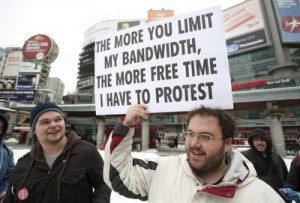
Moffett
A consolidated cable industry envisioned by Dr. John Malone, currently bidding for a merger between Charter Communications and Time Warner Cable, would feature widespread usage caps and usage billing and could obliterate competition from over-the-top online video providers, predicts a cable industry analyst.
Craig Moffett, now out on his own as co-head of independent Wall Street research firm MoffettNathanson, says broadband usage pricing is the sleeper issue of the last five years.
“I’ve written for years that [usage based pricing] is the single most important issue in all [the telecom sector],” Moffett said in an interview last week. “I’ve always been amazed by how little attention people have always paid to the issue.”
The Street reports that a unified cable cartel limiting consumer access to the Internet or more importantly monetizing that access would immediately devastate streaming video competitors including Netflix, Amazon, YouTube and Hulu.
If usage based pricing were implemented across the cable industry tomorrow, Moffett believes Netflix’s subscriber base would immediately fall from 30 million to 10 million. Nascent video players like Intel and Apple would likely find their business plans untenable, and some analysts believe the sweeping price changes would probably end the shift towards integrating streaming technology into large flat panel television sets.

Consumer backlash
Moffett says the impact would be broadly felt. Other analysts predict it could cause a national consumer uprising, especially at a time when other countries are swiftly moving to get rid of usage limits and consumption-based billing that have never been popular with customers.
“I think it will become clear that over the summer the window may have already closed for the cable operators to move to a usage based pricing theme,” Moffett said.
The Federal Communications Commission has done almost nothing about the issue of usage caps and usage pricing. Former FCC chairman Julius Genachowski even applauded the unpopular price scheme, calling it an important innovation.
Customers call it something else, and an uproar from consumers and competitors alike could overshadow the broadband successes of the Obama Administration. It would represent “a laughable setback for the nation’s communications infrastructure,” predict increasingly pessimistic Wall Street analysts concerned about the inevitable backlash.
The Street:
In a new broadband pricing regime, regulators would have to condone what consumers and competitors would immediately recognize as anti-competitive. Meanwhile, immensely popular content providers such as Netflix, Amazon Prime, Hulu, YouTube and the like would have to lose a Washington lobbying battle to the interests of cable monopolies, their arcane billing and off shored customer service.
Hollywood and broadcast networks would lose marginal new content buyers such as Netflix. Tablet makers such as Apple, Google, Samsung and Amazon would see the value of their fastest growing products put at risk.
Most importantly, it would be an affront to one of the few clear consumer victories for the Department of Justice in the Obama administration.


 Subscribe
Subscribe


 I’ve known Tom Wheeler for many years, and he is an inspired pick to lead the FCC. Mr. Wheeler’s combination of high intelligence, broad experience, and in-depth knowledge of the industry may, in fact, make him one of the most qualified people ever named to run the agency.
I’ve known Tom Wheeler for many years, and he is an inspired pick to lead the FCC. Mr. Wheeler’s combination of high intelligence, broad experience, and in-depth knowledge of the industry may, in fact, make him one of the most qualified people ever named to run the agency.
 We congratulate Tom Wheeler on his nomination as Chairman of the Federal Communications Commission. His vast knowledge of the communications industry, as well as his proven leadership, will be invaluable as the Commission sets its course for our nation’s digital future. We applaud President Obama’s nomination and we look forward to working with the Commission under Tom’s leadership.
We congratulate Tom Wheeler on his nomination as Chairman of the Federal Communications Commission. His vast knowledge of the communications industry, as well as his proven leadership, will be invaluable as the Commission sets its course for our nation’s digital future. We applaud President Obama’s nomination and we look forward to working with the Commission under Tom’s leadership. Telecommunications Industry Association
Telecommunications Industry Association

